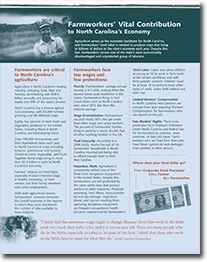
Order free hard copies | Download the PDF
Agriculture serves as the economic backbone for North Carolina, and farmworkers’ hand labor is needed to produce crops that bring in billions of dollars to the state’s economy each year. Despite this fact, farmworkers remain one of the state’s most economically disadvantaged and unprotected group of laborers.
Farmworkers are critical to North Carolina’s agriculture:
- Agriculture is North Carolina’s leading industry, including food, fiber and forestry, contributing over $69.6 billion annually and accounting for nearly one-fifth of the state’s income.
- North Carolina has a diverse agricultural economy, with 53,000 farmers growing over 80 different crops.
- Eighty-five percent of fresh fruits and vegetables produced in the United States, including those in North Carolina, are harvested by hand.
- Over 150,000 farmworkers and their dependents labor each year in North Carolina in crops including tobacco, greenhouse and nursery, Christmas trees, vegetables, and fruits.
- Together these crops bring in more than $2.4 billion in sales to North Carolina’s economy. Farmers’ reliance on hired labor, especially in labor-intensive crops, is steadily increasing, as farm owners and their family members seek other employment.
- With each agricultural season, farmworkers’ presence increases the overall economy in the regions in which they work and boosts the number of jobs available to local residents.
Farmworkers face low wages and few protections:
Poverty: Farmworkers’ average annual income is $11,000, making them the second lowest paid workforce in the nation. Farmworkers living in East Coast states such as North Carolina earn about 35% less than this national average.
Wage Discrimination: Farmworkers are paid nearly 50% less per week than other wage and salary workers. The percent of farmworker families living in poverty is nearly double that of other working families in the US.
Food Insecurity: According to a 2006 study, nearly five out of 10 farmworker households in North Carolina reported not being able to afford enough food to feed their families.
Hazardous Work: Agriculture is consistently ranked one of the three most dangerous occupations in the United States. Despite this, farmworkers are not protected by the same safety laws that protect workers in other industries. Pesticide poisoning, heat illness, musculoskeletal and eye damage, respiratory illness, and injuries resulting from operating dangerous equipment are frequent occupational health concerns experienced by farmworkers.
Child Labor: Labor laws allow children as young as 10 to work in farm work under certain conditions and with their parents’ consent. Children must be at least 14 to perform most other types of work, under both federal and state law.
Limited Workers’ Compensation: In North Carolina most growers are exempt from laws requiring Workers’ Compensation for farmworkers who are injured on the job.
Few Workers’ Rights: There is no protection from employer retaliation under North Carolina and federal law for farmworkers to unionize, work overtime, or take sick leave. Farmworkers who are fired from their jobs have fewer options to seek damages than workers in other sectors.
Hand-Harvested Agriculture in NC
Included below are statistics highlighting the state’s major hand-harvested agricultural crops, seasons, number of workers during peak harvest, and pay rates.
Farmworkers are typically paid hourly or by the bucket (5/8 bushel) of fruit or vegetable that they pick.
Did you know that in North Carolina a farmworker needs to pick and haul 125 buckets of sweet potatoes (two tons) to make $50?




